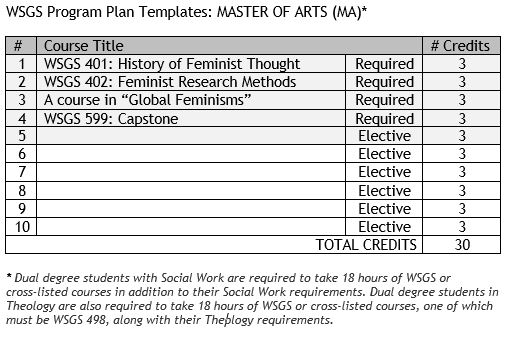Program Requirements
The requirements listed below are applicable to students entering the program after August 15, 2019.
To see the original program requirements for students entering the program before August 15, 2019, please see here.
#1. WSGS 401: History of Feminist Thought
WSGS 401 surveys the historical development of feminist thought from Mary Wollstonecraft to second-wave feminism and analyzes the impact of feminism on the general culture. Offered every fall.
#2. WSGS 402: Feminist Research Methods
WSGS 402 begins with a history of women's education in the United States and traces the institutional and intellectual development of women's studies as a field, focusing on the evolution of women's studies in the academy (here and in other countries) and on the changes in concepts of knowledge, in methodologies, and in pedagogy that women's studies scholarship has produced in various fields. Offered every spring.
WSGS 402 also introduces students to archival research using Loyola University's Women and Leadership Archives.
#3. A course in "Global Feminisms"
The third core requirement is a course that explores feminism in a global dimension; a number of different courses can satisfy this requirement. Offered at least once every year.
#4. WSGS 599: Capstone
As part of the M.A. program, all students must complete a capstone experience of their choice: an internship, a thesis, or a self-designed practicum. Upon completion of the program, all students do a capstone presentation -- reflecting on the culmination of their work in the program as well as future applications of their WSGS curriculum -- at the biannual WSGS capstone ceremony and celebration.
Along with the capstone presentation, students are required to submit a brief synthesis paper and annotated bibliography of ten sources in Women’s Studies and Gender Studies that have been influential to their work.
#5-8. Electives
Some WSGS electives, like Queer Theory, are offered on a yearly basis. Other electives are offered through the departments (including English, History, Philosophy, Sociology, Political Science, Theology, Communications, Law, and Social Work) and vary from semester to semester.
Tracks of Study
Students must choose one of the following concentration tracks for at least three of their electives. Dual-degree students will not be required to choose a concentration beyond their dual degree, but they may organize their electives around a concentration if they choose.
-
Global and Transnational
-
Gender and Violence
-
Bodies and Sexualities
-
Religion and Ethics
-
Expressive Arts
-
Self-designed concentration (must be approved by the GPD based on a written statement explaining the merits of the proposed course of study)
You are allowed to count up to two 300-level courses towards the M.A. degree. If you enroll in one of the approved 300-level cross-listed courses, you must make arrangements with the instructor to complete additional readings and graduate-level assignments.
Dual-degree students may not double-count SOWK courses for credit in both programs.



